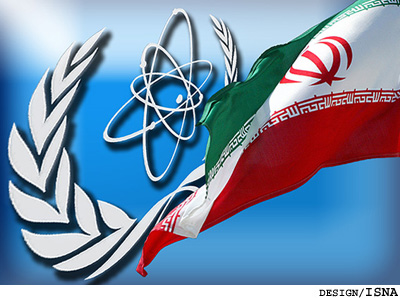 0708 GMT: Ahmadinejad Watch. He may have been sidelined in the Islamic Republic's nuclear talks with the "West", with his supporters sniping at the discussions, but President Ahmadinejad is still grabbing for the limelight.
0708 GMT: Ahmadinejad Watch. He may have been sidelined in the Islamic Republic's nuclear talks with the "West", with his supporters sniping at the discussions, but President Ahmadinejad is still grabbing for the limelight.
Press TV headlines Ahmadinejad's rhetoric, using a photo opportunity with an advisor to the Sudanese President, “Today, arrogant powers and the enemies of mankind have put pressure on independent nations and governments, including Iran and Sudan. It is upon all independent nations and governments to stand up against expansionists through solidarity, brotherhood and supporting one another."
And news breaks that Ahmadinejad will visit China in June for a "security summit", with the gloss that he will discuss nuclear issues with Chinese President Hu Jintao.
0705 GMT: Subsidy Cuts Watch. A significant concession from the Minister of Economy Shamseddin Hosseini --- although he did not present it this way --- on Tuesday, as he said that the timing for the implementation of the second phase of subsidy cuts is "not clear".
Government officials said in December that the second phase was "imminent", but the plan has been beset by political criticism and economic difficulties.
0625 GMT: Nuclear Watch. Another sign backing our caution about major developments, at least in public, in today's Baghdad talks:
Officials from the administration of US President Barack Obama stressed their intention to maintain a tough stance during talks with Iran, according to Jewish leaders who met with top White House staff on Monday.Ahead of negotiations in Baghdad over the Iranian nuclear program, the officials said that the US has no plan to reduce sanctions during the talks, and that it was their firm expectation that the EU would still be imposing an oil embargo on Iran at the beginning of July with no exemptions for British shipping insurance, participants said.
Some 70 members of the Conference of Presidents of Major Jewish Organizations met with US Vice President Joe Biden, Deputy National Security Adviser Denis McDonough, Deputy Secretary of State Thomas Nides and other administration officials in a series of closed door meetings.
0610 GMT: Today's lead Iran story comes from neighbouring Iraq, where the Islamic Republic's officials will resume formal talks with the 5+1 Powers (US, UK, France, Germany, Russia, and China) over Tehran's nuclear programme.
What to watch for? We offer an analysis, "A Guide to Watching Today's Nuclear Talks".
Perhaps surprisingly --- given my distrust of his tough-guy, pro-Israel approach while he was in the Obama Administration --- EA's assessment intersects with that of Dennis Ross:
I don't believe that we should be looking at [today] as being a make-or-break meeting where if there isn't an unmistakable breakthrough then the process isn't a real process. One doesn't need to see a breakthrough in these talks. That's unrealistic at this point. The idea that you have a breakthrough after only two rounds, I think, given everything going on, is just not realistic....
There needs to be an indication that the talks really do have a kind of intensive ongoing character and they're meeting on almost what I would describe as nearly a continuous basis.
What Ross omits, however, is the Damocles' Sword over that notion of a long, developing negotiation towards a deal. We note:
Here's the problem. The Islamic Republic may not have the time to "play long". The economy is tottering. The US, Europe, and now some countries and institutions elsewhere have put the squeeze on Iran's Central Bank and financial transactions. And now 1 July looms --- the day that the European Union imposes a ban on imports of oil from Iran.
Posted via email from lissping
No comments:
Post a Comment
Note: only a member of this blog may post a comment.